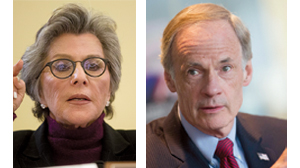Trust Fund Extensions Pitched; Proposals Clash Over Length

This story appears in the May 18 print edition of Transport Topics.
WASHINGTON — The top Democrats on the Senate Environment and Public Works panel unveiled legislation May 14 that would extend surface transportation authorization into July, even as House GOP leaders say they soon will offer an extension through December.
Congress will have a week to approve either plan before highway funding authority expires May 31. Lawmakers are scheduled to recess for Memorial Day the week of May 25.
The two-month extension sponsored by Sens. Barbara Boxer of California and Tom Carper of Delaware would call on congressional transportation authorizers to finish a multiyear highway bill and clear it for the president soon.
“In the 10 months since the last short-term extension of the Highway Trust Fund, we’ve come no closer to a solution for providing the long-term funding that is desperately needed to support a multiyear transportation bill,” Carper said. “Our governors, mayors, citizens and businesses are counting on us to do better than we did last summer and give them the certainty they need for a 21st-century transportation system. I fear the alternative, kicking the can closer to another election, is a recipe for letting them down yet again.”
The Democrats offered their bill a day after EPW’s chairman, Sen. James Inhofe (R-Okla.), said he would schedule a markup in July on a six-year transportation bill.
GOP leaders in the House have yet to unveil their plan.
As Congress waits to act on highway funding fixes, stakeholders here for Infrastructure Week urged lawmakers to craft a long-term highway bill.
On May 14, a panel of transportation experts debated several proposals to rescue the nearly insolvent trust fund but offered little hope that Congress would approve a long-term solution.
“The need for a new stable source of transportation revenue is more pressing than ever,” said Kevin DeGood, director of infrastructure policy at the Center for American Progress. “Since 2006, Congress has transferred more than $65 billion from general funds into the Highway Trust Fund to stave off insolvency.”
Uncertainty over the fate of the trust fund has caused some states to prepare two transportation budgets: one that assumes continued levels of federal funding and the other estimating cuts, DeGood said.
The event was sponsored by the Eno Center for Transportation and the American Action Forum.
Rep. Jim Renacci (R-Ohio), said his proposed bipartisan legislation indexes the gas and diesel user fees to inflation, raising about $27.5 billion and providing infrastructure funding through 2016. After that, Renacci said his bill would appoint a special bicameral, bipartisan commission to study long-term fixes.
Renacci said he opposes again dipping into the general fund to keep the trust fund solvent.
If the general fund has a surplus, then maybe we could go into the general fund,” Renacci said.
Doug Holtz-Eakin, president of the American Action Forum, said he is “politically fatigued” by the fight in Congress over transportation funding.
“I’m really tired of this show,” he said. “There’s a logic to what the congressman has proposed, there’s a logic to a vehicle-miles tax, and there’s a logic to a lot of 21st-century fee-based funding systems. But I don’t see the politics lining up in the foreseeable future.”
Jeff Davis, a senior fellow at Eno, said that several proposed “repatriation” bills that would tax overseas profits of U.S. multinational corporations “is just not going to happen.”
“The administration’s proposal basically would require General Electric to write a $16.7 billion check to the Highway Trust Fund, Microsoft $13 billion, Pfizer $10.4 billion, Apple $9.8 billion, IBM $8.4 billion.” he said.
Meanwhile, state leaders say they cannot keep waiting for Congress to approve federal dollars for infrastructure projects.
Virginia Gov. Terry McAuliffe, a Democrat, said there are 341 projects that will have to stop unless Congress acts. During a bill-signing event for a new state transportation law at George Mason University in Arlington on May 12, McAuliffe urged all members of his audience “to reach out” to their U.S. representatives and urge them to come up with a new transportation plan.
McAuliffe, elected to a single four-year term in November 2013, said Virginia gets about $1 billion a year in matching transportation funds from the federal government. He criticized Congress for “kicking the can down the road” rather than producing a long-term solution.
McAuliffe said Virginia is spending its own tax revenue on state roads and bridges because transportation is necessary for a growing economy.
“I couldn’t bring in businesses to the commonwealth without great infrastructure. We’re spending
$5 billion a year on roads and multimodal projects,” he told a conference at the university’s public policy school.
Jonathan S. Reiskin contributed to this article.

